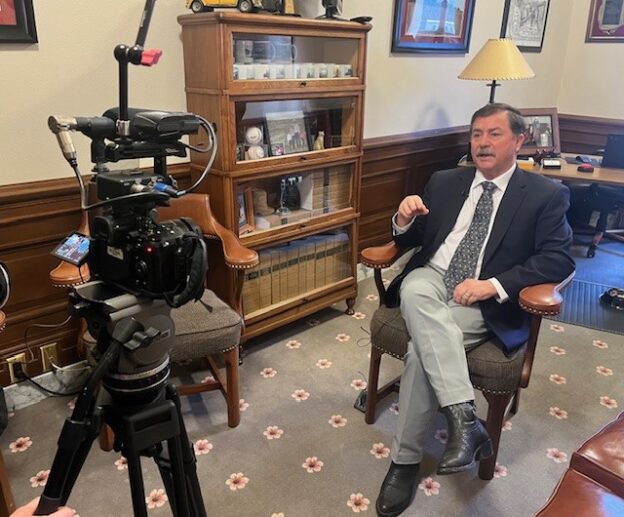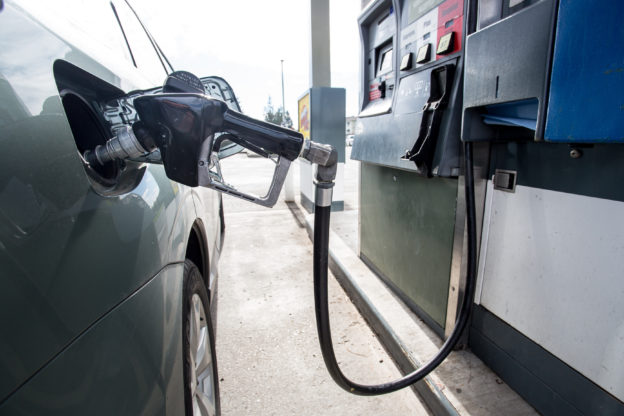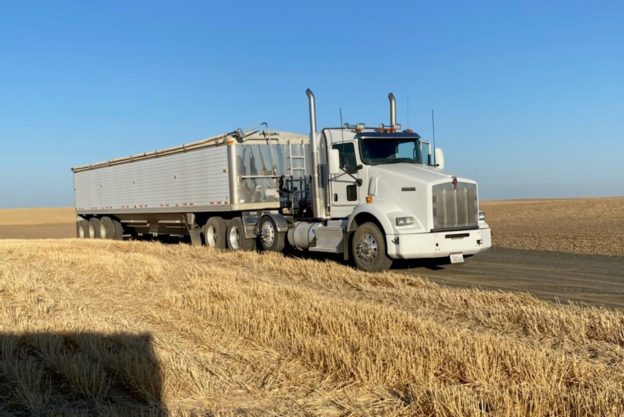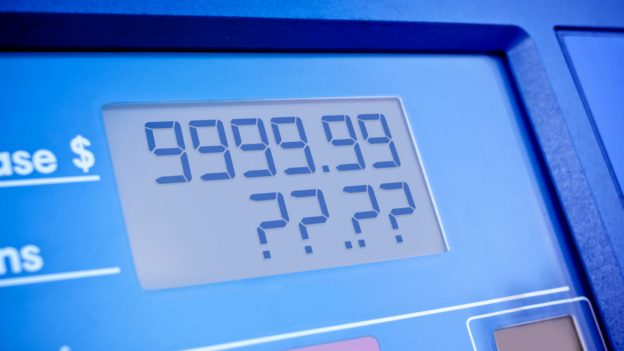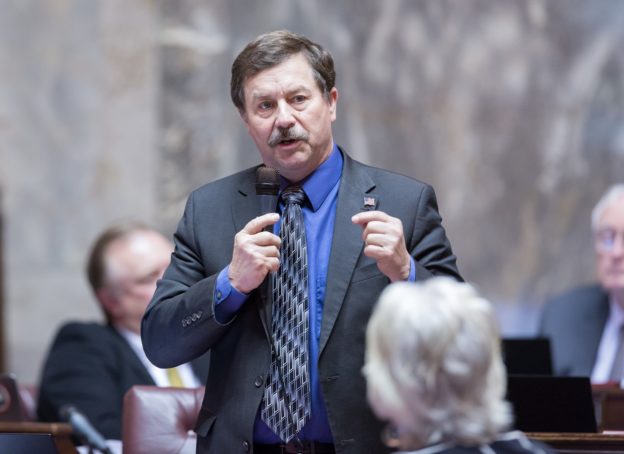Tag Archives: transportation
OLYMPIA… The two state senators who farm in eastern Washington say they’re not sure what to make of a proposed offer of money for farm-fuel users who got stuck paying a surcharge on their fuel purchases because of the state’s cap-and-trade law.
The payments, which could amount to no more than pennies per gallon for many farming operations, are offered in the state Senate’s supplemental operating-budget proposal.
“I don’t know anyone in the agricultural sector who would view this as a solution to the fuel-surcharge issue we’ve been fighting more than a year, since cap-and-trade was fully implemented,” said Sen. Perry Dozier, R-Waitsburg.
“These payments wouldn’t come close to making up for what farm-fuel users have been forced to pay because the executive branch of state government failed to uphold the promise made in the cap-and-trade law – that farm diesel and fuel used by the maritime industry would be exempt from the surcharge this new program would create,” said Sen. Mark Schoesler, R-Ritzville.
Schoesler serves on the Senate Ways and Means Committee, which held a public hearing yesterday on the proposed supplemental operating budget. The budget appropriation doesn’t refer to the payments as rebates or reimbursements, and routes them through the state Department of Licensing – not the Department of Ecology, which is responsible for implementing the cap-and-trade law.
“Are these payments a way for the state to ease its guilty conscience for failing so badly on upholding the promised fuel-surcharge exemption? Does the timing have anything to do with the certification of the initiative to repeal the cap-and-trade law? Are the supporters of cap-and-trade just looking to throw a bone to agriculture? No one who buys farm fuel by the truckload would come up with this,” said Dozier.
Dozier and Schoesler are the sponsors of Senate Bill 5728, introduced in 2023. It would basically force Ecology to develop a process for implementing the promised exemptions. The bill has been ignored, and a task force set up by Ecology during the summer failed to completely resolve industry concerns.
Given that background, the senators were surprised to see a $30 million appropriation, buried on page 564 of the new Senate budget proposal, “solely for payments to support farm fuel users and transporters who have purchased fuel for agricultural purposes that is exempt from the requirements of the Climate Commitment Act… but paid a surcharge or an additional fee.”
The payments would be made by the Department of Licensing to “noncorporate farms” first – a term not defined in the budget bill – depending on annual farm-fuel consumption. The first tier, those using less than 1,000 gallons annually, would receive $600; the second tier, between 1,000 and 4,000 gallons consumed, would get $2,300; and those using 4,000 gallons or more a year would receive $3,400.
“It’s a lame proposal because most farms of any size operate as a corporation,” said Schoesler. “On top of that these tiers make no sense, except they’re consistent with the whole premise of cap-and-trade – or ‘cap-and-tax,’ as it should really be called. This law is about punishing people who use fossil fuel. It’s as though they think there are electric combines down at the farm-equipment dealer.”
Dozier agrees the tiered approach is not realistic. “One tractor pulling a heavy load can go through 25 gallons of fuel an hour. At that rate just one week of 10-hour workdays will blow past the 1,000-gallon threshold.
“It’s not difficult for a farm to go through 30,000 gallons of diesel in a year. Under this proposal, that’s 11 cents per gallon. Adding more tiers based on 10,000-gallon increments would be a slight improvement, but if the intent is to honestly compensate users who have been paying the surcharge, the payments to them should really be gallon for gallon, with no tiers at all.”
The Senate budget proposal also includes $35 million to provide low-income households with energy utility bill assistance. Like the payments proposed for farm-fuel users, those subsidies would be funded with proceeds from the cap-and-trade law, which has enabled state government to rake in about $1.8 billion in the past year from auctioning “carbon allowances.”
“In December the governor proposed using cap-and-trade money to subsidize low-income households. It wasn’t a surprise to also see it in the Senate budget. But this money to pay farm-fuel users feels like something thrown in at the last minute by people who don’t understand agriculture,” said Schoesler.
“This is a pretty responsible budget proposal overall, and I appreciate that Republicans had a fair amount of input about the priorities,” said Dozier, “but it needs some work to be a budget that truly respects the needs of agriculture.”
The recent carbon allowance auction held by the state Department of Ecology under the state’s costly cap-and-trade program will mean even higher fuel prices for drivers in Washington just as the summer driving season is about to start, says 9th District Sen. Mark Schoesler.
“Drivers across Washington will pay even more at the pump thanks to the cap-and-trade program,” said Schoesler, R-Ritzville. “Fuel prices typically rise when summer driving season arrives, and this latest auction by DOE will cause trips to the gas station to be even more expensive for both drivers here and those from other states who want to see Washington.”
Today’s release of the results from DOE’s May 31 auction showed that the price for a Washington carbon allowance was $56.01, up from $48.50 in the February auction. It is estimated that the new allowance price will translate to an additional charge of 45 cents a gallon at the pump. This is slightly higher than the estimated 39-cents-per-gallon impact from February’s auction by DOE.
A rough estimate for revenue raised in last week’s auction is about $480.8 million for current vintage allowances and about $76.2 million for future vintage allowances. The February auction collected nearly $300 million.
Schoesler said Gov. Inslee’s expensive cap-and-trade program, known as the Climate Commitment Act and approved by Democrat majorities in the Legislature in 2021, is taking hundreds of millions of dollars out of drivers’ wallets and handing it over to state agencies for various spending programs, all in the name of climate change.
“The latest carbon auction by DOE is just another example of the Democrats’ spending spree in Olympia that will affect people throughout Washington. Starting July 1, most workers across our state will also have to start paying an expensive payroll tax to fund a very flawed long-term care program.
“It’s shocking how Democrats actually seem to be proud about taking so much money away from citizens. Olympia needs to stop squeezing even more money out of hard-working taxpayers and instead start respecting them,” added Schoesler.
The report from Ecology’s May 31 auction can be viewed here.
Two environmental laws from the Democratic-controlled Legislature and Gov. Jay Inslee that took effect Jan. 1 are already causing fuel prices in Washington to rise, says state Sen. Mark Schoesler, R-Ritzville.
Schoesler, who represents eastern Washington’s 9th Legislative District, said he was notified by the Washington Independent Energy Distributors Association. that wholesale gasoline and diesel prices have risen in Washington as a result of the “cap-and-tax” law and the law creating a low-carbon fuel standard. Both laws were passed by the Legislature in 2021 but did not take effect until now.
Schoesler said wholesale fuel numbers he saw this week revealed gasoline prices had increased by 33.06 cents a gallon due to the “cap-and-tax” law and by 1.54 cents per gallon because of the low-carbon fuel standard. Meanwhile, the wholesale price of a gallon of diesel rose by 42.35 cents as a result of cap-and-tax and by 1.46 cents due to LCFS. Schoesler noted heating-fuel prices also have sharply increased in recent days, with more than two months of winter ahead.
“The wholesale fuel prices that I saw clearly show that ‘cap-and-tax’ and the low-carbon fuel standard are forcing fuel prices to increase at eastern Washington gas stations, and western Washington gas stations likely will see a similar hike. This contradicts claims by the governor and some of his allies that ‘cap-and-tax’ and LCFS will cause fuel prices to go up by only a few cents a gallon.
“Ever since these two laws were passed by the Democrats and signed by the governor, I’ve warned that they will force fuel prices to significantly increase. Now that these laws have gone into effect, we’re seeing that they indeed are causing hikes in fuel and heating-oil prices. This will hurt nearly everyone – commuters, parents taking their kids places, truckers and delivery drivers, and those working in agriculture. These increases will act like a gas-tax hike, but with no guaranteed benefits for our roads and highways.”
The statewide transportation package passed primarily by Puget Sound-area Democrats in March is now fully subsidizing public-transit and state-ferry travel in some parts of the state for anyone 18 or younger. An eastern Washington legislator, 9th District Sen. Mark Schoesler, says the free-rider program discriminates against kids in rural Washington.
“Unfortunately, this is another example of how the Democratic majority preaches about ‘equity’ without truly practicing it,” said Schoesler, R-Ritzville. “They had to know offering free transit and ferry rides would benefit primarily kids in populous areas, rather than kids in rural counties, even though rural families help pick up the tab.”
Eight Puget Sound-area public-transit agencies began offering free youth fares last week. Other agencies statewide that implement a zero-fare program for riders 18 and under by Oct. 1 will also receive subsidies in the form of grants under the so-called Move Ahead Washington transportation package.
Schoesler also said most Washington motorists won’t be able to benefit from maintenance projects that are underway on parts of Interstate 5, I-405, I-90 and several state highways in King, Snohomish, Skagit and Whatcom counties, even though they are helping to pay for the projects through the Move Ahead Washington package and the “cap-and-tax” legislation approved by Democratic majorities in the Legislature.
“I know the Puget Sound counties have important highway maintenance needs, but so do other parts of our state. I’d like to see the Department of Transportation be as committed to completing highway projects in eastern Washington as it is for the Puget Sound region. We pay taxes and fees, too,” said Schoesler.
“Governor Inslee has been playing up the free transit rides to kids and the Puget Sound-area highway projects. Instead of focusing on programs and projects that mainly help out his supporters, the governor should focus more on the transportation needs of the entire state,” added Schoesler.











